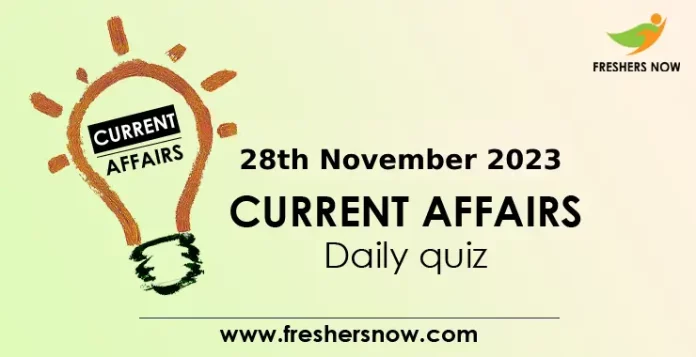
28th November 2023 Current Affairs Quiz: On 28th November 2023, a myriad of significant events unfolded across the globe, shaping the course of current affairs. As we delve into the 28th November 2023 Current Affairs Quiz, we embark on a journey to explore and assess the latest developments in diverse fields, ranging from politics and economics to science and the environment. This quiz serves as a platform to test our understanding of the dynamic world we inhabit, allowing us to stay informed and engaged with the ever-evolving tapestry of global affairs. Join us in unraveling the intricacies of the notable events that transpired on this day and test your knowledge on the latest happenings that have captured the world’s attention.
28th November 2023 Current Affairs | Today GK Quiz
1. What is the effective date of Rajat Kumar Jain’s approval as Part-time Chairman of Fino Payments Bank by the Reserve Bank of India?
A) November 1, 2023
B) November 24, 2023
C) November 1, 2025
D) November 24, 2025
Answer: B) November 24, 2023
Explanation: Rajat Kumar Jain’s approval as Part-time Chairman is effective from November 24, 2023.
2. What is Fino Payments Bank’s business model based on, and how did it perform in the second quarter of the fiscal year 2023-24 in terms of digital transactions?
A) Asset-heavy model, Rs. 2.55 lakh crores
B) Asset-light model, Rs. 23,051 crore
C) Fee-based income, Rs. 86,568 crore
D) Commission-based income, Rs. 19.5 crore
Answer: B) Asset-light model, Rs. 23,051 crore
Explanation: Fino Payments Bank operates on an asset-light model, and in the second quarter of the fiscal year 2023-24, it processed more than Rs. 23,051 crore in digital transactions.
3. What is the primary purpose of the Indian Army’s tender for the acquisition of 200 new mounted howitzers with 105 mm guns?
A) Coastal Defense
B) Jungle Warfare
C) High-altitude Border Areas
D) Urban Security
Answer: C) High-altitude Border Areas
Explanation: The primary purpose of the tender is to enhance mobile firepower in high-altitude border areas like the Line of Actual Control with China.
4. What approach is the Indian Army taking for the modernization of its artillery capabilities?
A) International Collaboration
B) ‘Make in China’ Initiative
C) ‘Make in India’ Route
D) Outsourcing to Foreign Firms
Answer: C) ‘Make in India’ Route
Explanation: The Indian Army is pursuing indigenous modernization of its artillery capabilities through the ‘Make in India’ route, leveraging the capabilities of Indian firms.
5. What is the significant change introduced by SEBI to enhance fundraising capabilities for Not for Profit Organisations (NPOs) on the social stock exchange?
A) Increase in the minimum issue size
B) Introduction of new financial instruments
C) Decrease in the minimum issue size for ZCZP
D) Restriction on NPOs’ participation
Answer: C) Decrease in the minimum issue size for ZCZP
Explanation: SEBI has decided to decrease the minimum issue size for public issuance of Zero Coupon Zero Principal Instruments (ZCZP) from Rs 1 crore to Rs 50 lakh, to make fundraising more accessible for NPOs.
6. What is the purpose of SEBI’s decision to regulate online platforms offering fractional ownership of real estate assets?
A) Encourage speculative investment
B) Ensure a structured and secure environment for investors
C) Restrict the growth of Real Estate Investment Trusts (REITs)
D) Provide tax incentives for real estate investments
Answer: B) Ensure a structured and secure environment for investors
Explanation: SEBI aims to bring online platforms offering fractional ownership of real estate assets under the regulatory framework for small and medium Real Estate Investment Trusts (REITs), to ensure a structured and secure environment for investors participating in this segment.
7. What is the main target for reducing emissions intensity, as emphasized by the International Energy Agency (IEA) in the report?
A) Achieving zero emissions by 2030
B) Reducing emissions by 60 percent by 2040
C) Achieving near-zero emissions intensity by the early 2040s
D) Reducing emissions by 45 percent by 2050
Answer: C) Achieving near-zero emissions intensity by the early 2040s
Explanation: The report highlights the imperative for global oil and gas operations to achieve near-zero emissions intensity by the early 2040s.
8. What financial resource allocation shift does the report recommend for oil and gas producers to play a substantial role in clean energy transitions?
A) Divesting from clean energy projects
B) Investing 50 percent in fossil fuel projects by 2030
C) Maintaining the current financial allocation
D) Investing 50 percent of capital expenditures in clean energy projects by 2030
Answer: D) Investing 50 percent of capital expenditures in clean energy projects by 2030
Explanation: The report recommends a significant shift in financial resource allocation, specifically suggesting that oil and gas producers invest 50 percent of their capital expenditures in clean energy projects by 2030.
9. According to the information provided, what is the estimated prevalence of physical and/ or sexual violence against women in the South-East Asia Region?
A) 16%
B) 25%
C) 33%
D) 40%
Answer: C) 33%
Explanation: The South-East Asia Region ranks second-highest, with an estimated 33% prevalence of physical and/ or sexual violence against women.
10. What is the significance of the timing of the World Health Organization Regional Director’s statements on violence against women?
A) International Women’s Day
B) Human Rights Day
C) 16 Days of Activism for No Violence against Women
D) World Health Day
Answer: C) 16 Days of Activism for No Violence against Women
Explanation: The WHO Regional Director’s statements coincide with the start of the annual campaign, “16 Days of Activism for No Violence against Women,” which runs from November 25 to December 10.
★★ You Can Also Check ★★



